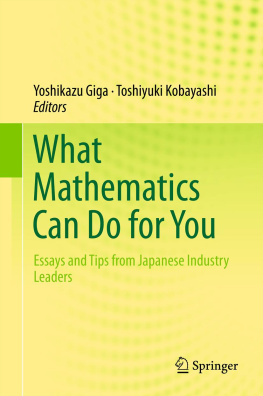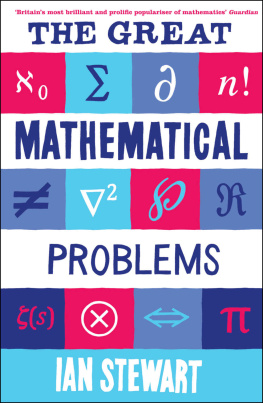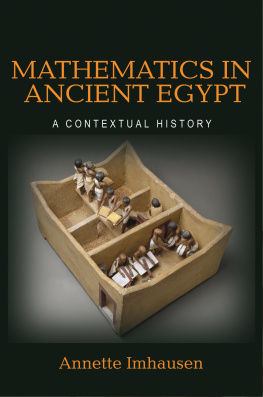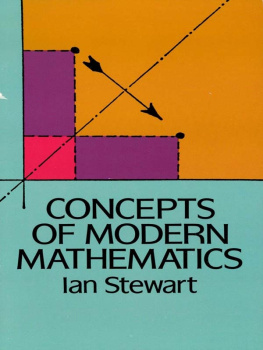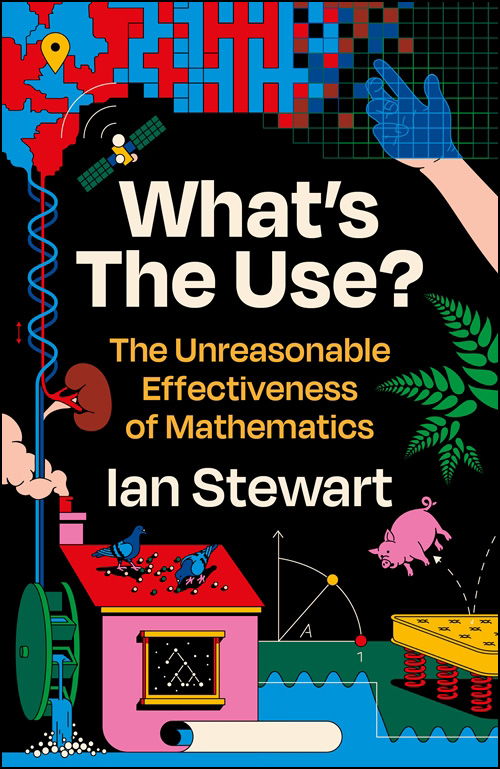Contents
Guide
WHATS THE USE?
Also by Ian Stewart
Does God Play Dice?
Fearful Symmetry
Natures Numbers
Lifes Other Secret
Flatterland
The Annotated Flatland
Letters to a Young Mathematician
Why Beauty is Truth
Professor Stewarts Cabinet of Mathematical Curiosities
Mathematics of Life
Professor Stewarts Hoard of Mathematical Treasures
Seventeen Equations that Changed the World
(Alternative Title: In Pursuit of the Unknown)
The Great Mathematical Problems
(Alternative Title: Visions of Infinity)
Symmetry: A Very Short Introduction
Professor Stewarts Casebook of Mathematical Mysteries
The Beauty of Numbers in Nature
Professor Stewarts Incredible Numbers
Calculating the Cosmos
Significant Figures
Do Dice Play God?
WHATS THE USE?
The Unreasonable Effectiveness of Mathematics
IAN STEWART

First published in Great Britain in 2021 by
Profile Books Ltd
29 Cloth Fair
London
EC1A 7JQ
www.profilebooks.com
Copyright Joat Enterprises, 2021
The moral right of the author has been asserted.
All rights reserved. Without limiting the rights under copyright reserved above, no part of this publication may be reproduced, stored or introduced into a retrieval system, or transmitted, in any form or by any means (electronic, mechanical, photocopying, recording or otherwise), without the prior written permission of both the copyright owner and the publisher of this book.
All reasonable efforts have been made to obtain copyright permissions where required. Any omissions and errors of attribution are unintentional and will, if notified in writing to the publisher, be corrected in future printings.
A CIP catalogue record for this book is available from the British Library.
ISBN 9781781259412
eISBN 9781782834007
Export ISBN 9781788168076
Unreasonable Effectiveness
The miracle of the appropriateness of the language of mathematics for the formulation of the laws of physics is a wonderful gift which we neither understand nor deserve. We should be grateful for it and hope that it will remain valid in future research and that it will extend, for better or for worse, to our pleasure even though perhaps also to our bafflement, to wide branches of learning.
Eugene Wigner, The Unreasonable Effectiveness of Mathematics in the Natural Sciences
What is mathematics for?
What is it doing for us, in our daily lives?
Not so long ago, there were easy answers to these questions. The typical citizen used basic arithmetic all the time, if only to check the bill when shopping. Carpenters needed to know elementary geometry. Surveyors and navigators needed trigonometry as well. Engineering required expertise in calculus.
Today, things are different. The supermarket checkout totals the bill, sorts out the special meal deal, adds the sales tax. We listen to the beeps as the laser scans the barcodes, and as long as the beeps match the goods, we assume the electronic gizmos know what theyre doing. Many professions still rely on extensive mathematical knowledge, but even there, weve outsourced most of the mathematics to electronic devices with built-in algorithms.
My subject is conspicuous by its absence. The elephant isnt even in the room.
It would be easy to conclude that mathematics has become outdated and obsolete, but that view is mistaken. Without mathematics, todays world would fall apart. As evidence, Im going to show you applications to politics, the law, kidney transplants, supermarket delivery schedules, Internet security, movie special effects, and making springs. Well see how mathematics plays an essential role in medical scanners, digital photography, fibre broadband, and satellite navigation. How it helps us predict the effects of climate change; how it can protect us against terrorists and Internet hackers.
Remarkably, many of these applications rely on mathematics that originated for totally different reasons, often just the sheer fascination of following your nose. While researching this book I was repeatedly surprised when I came across uses of my subject that Id never dreamed existed. Often they exploited topics that I wouldnt have expected to have practical applications, like space-filling curves, quaternions, and topology.
Mathematics is a boundless, hugely creative system of ideas and methods. It lies just beneath the surface of the transformative technologies that are making the twenty-first century totally different from any previous era video games, international air travel, satellite communications, computers, the Internet, mobile phones. Scratch an iPhone, and youll see the bright glint of mathematics.
Please dont take that literally.
*
Theres a tendency to assume that computers, with their almost miraculous abilities, are making mathematicians, indeed mathematics itself, obsolete. But computers no more displace mathematicians than the microscope displaced biologists. Computers change the way we go about doing mathematics, but mostly they relieve us of the tedious bits. They give us time to think, they help us search for patterns, and they add a powerful new weapon to help advance the subject more rapidly and more effectively.
In fact, a major reason why mathematics is becoming ever more essential is the ubiquity of cheap, powerful computers. Their rise has opened up new opportunities to apply mathematics to real-world issues. Methods that were hitherto impractical, because they needed too many calculations, have now become routine. The greatest mathematicians of the pencil-and-paper era would have flung up their hands in despair at any method requiring a billion calculations. Today, we routinely use such methods, because we have technology that can do the sums in a split second.
Mathematicians have long been at the forefront of the computer revolution along with countless other professions, I hasten to add. Think of George Boole, who pioneered the symbolic logic that forms the basis of current computer architecture. Think of Alan Turing, and his universal Turing machine, a mathematical system that can compute anything thats computable. Think of Muhammad al-Khwarizmi, whose algebra text of AD 820 emphasised the role of systematic computational procedures, now named after him: algorithms.
Most of the algorithms that give computers their impressive abilities are firmly based on mathematics. Many of the techniques concerned have been taken off the shelf from the existing store of mathematical ideas, such as Googles PageRank algorithm, which quantifies how important a website is and founded a multi-billion dollar industry. Even the snazziest deep learning algorithm in artificial intelligence uses tried and tested mathematical concepts such as matrices and weighted graphs. A task as prosaic as searching a document for a particular string of letters involves, in one common method at least, a mathematical gadget called a finite-state automaton.
The involvement of mathematics in these exciting developments tends to get lost. So next time the media propel some miraculous new ability of computers to centre stage, bear in mind that hiding in the wings there will be a lot of mathematics,


